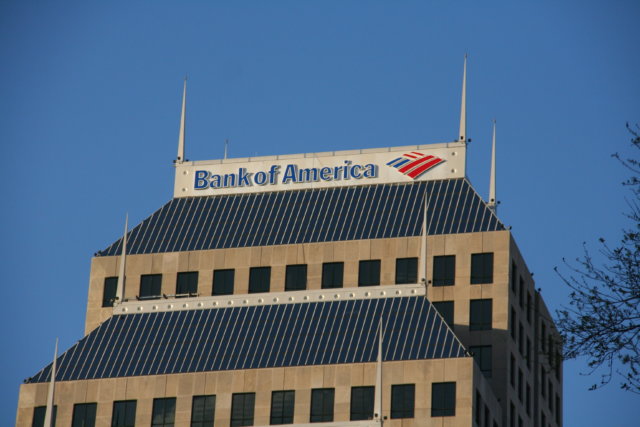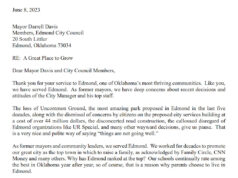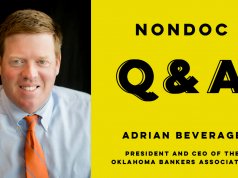(Editor’s note: The following letter is in response to one from Oklahoma Bankers Association president and CEO Roger Beverage, which we posted March 23. In turn, Beverage’s letter was a response to Brian Beuchaw’s letter posted March 17.)
To the editors:
First of all, I need to mention that the only thing I read about Dodd-Frank reform that was authored by Elizabeth Warren was her quote. I received my information from other numerous sources besides her, some of which are listed in the original letter and below.
Now, on to the rest.
My claims about the HMDA data are not baseless. If they were, then why did 21 national organizations and over 150 local and state organizations sign a letter against Section 104, the Home Mortgage Disclosure Act Adjustment, of S. 2155?
As far as “tailor”ing new rules for 25 out of the largest 38 banks, here’s some pertinent info about that section (401) of the bill that doesn’t quite sound like what you describe:
The upper limit of the enhanced prudential standards is $50 billion now but would be raised to $250 billion by S. 2155. The $50 billion threshold covers approximately the 40 largest banks in the nation, but raising it to $250 billion would exempt around 25 of those banks.
As Gregg Gelzinis, a research associate for Economic Policy at Center for American Progress (CAP), wrote in a December 2017 article for Morning Consult:
In practical terms, the banks deregulated by the section would (i) no longer have to file living wills with regulators to plan for their orderly failure; (ii) no longer be subjected to new post-crisis liquidity requirements that ensure banks are able to meet their obligations during a period of stress; (iii) no longer perform company-run stress testing that enhances the risk management capacity of banks; and (iv) will not be constrained by proposed single counterparty credit limits that aim to limit risks that distress at one bank but will tear down another.
A November 2017 letter from the CAP backs that up.
About the bailout money being paid back
So, it’s just fine that banks failed and almost took down the entire economy with them because of lax regulations/oversight/
Cons outweigh pros of S. 2155
There are some good things in the bill for consumers, I won’t dispute that, but there are quite a few more things in S. 2155 that benefit bankers, banks and the banking system way more than they benefit consumers, which is the general direction our country has been moving in the past many years (hence Dodd-Frank and the CFPB being created to try to look out for the consumer).
More information on S.2155 can be found at these links and by searching the internet and checking the footnotes in all the citations:
- Fact Sheet: The Senate’s Bipartisan Dodd-Frank Rollback Bill)
- Beware of the bank deregulation Trojan horse (written by a former attorney who was in the Banking Regulation & Policy Group of the Federal Reserve Board’s Legal Division)
(Editor’s note: As a responsible public forum, NonDoc runs Letters to the Editors between 300 words and 400 words and reserves the right to edit lightly for length, style and grammar. We value a diverse set of voices discussions issues from different perspectives. To submit a letter for publication, please write to letters@nondoc.com.)





















